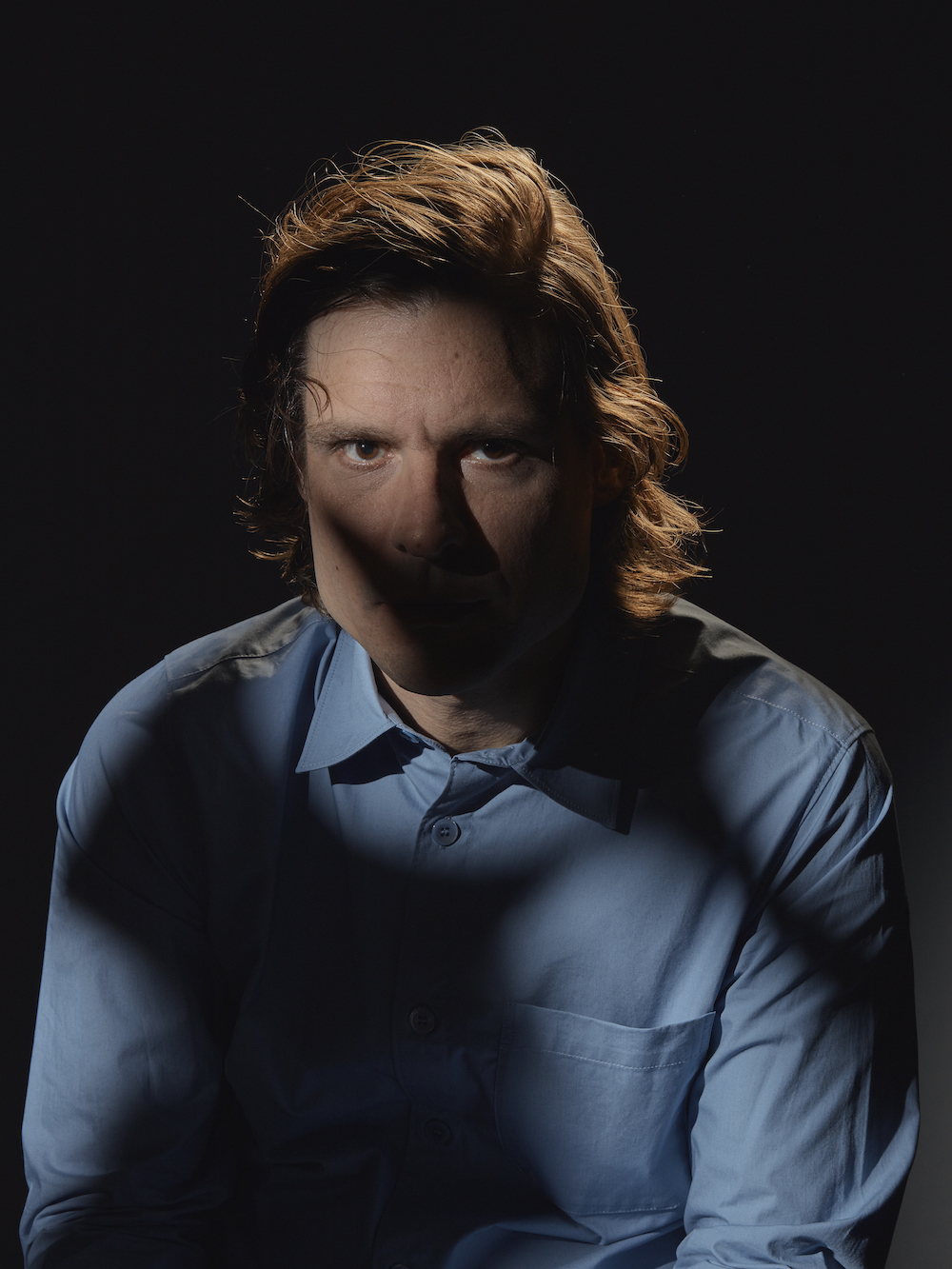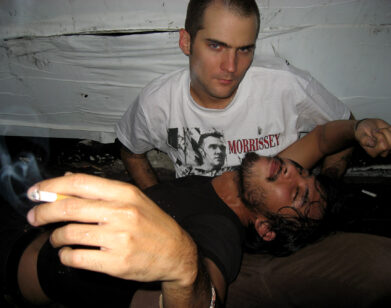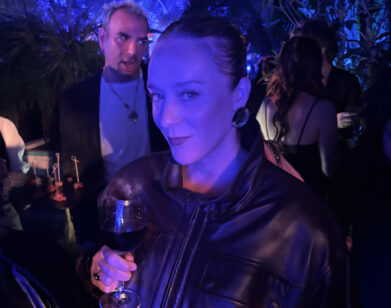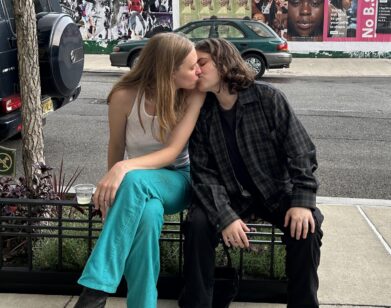John Maus talks to Chloë Sevigny about music, movies, and solitude
“I see the combine coming/It’s going to dust us all to nothing.”
This is the first line of John Maus’s new album Screen Memories, which is out now, and it summarizes the singer’s apocalyptic mood. Techno-pessimism—the idea that technology has dangerous aspects—guides the record, even as Maus’s custom-built analog synths drench its songs in gorgeous, cinematic textures. It’s an appealing paradox that lies at the heart of the post-punk savior’s oeuvre. The future may seem grim, but there’s dark appeal in the mechanisms of ruin.
Maus rose to prominence in the ’00s with a bold synthesis of New Wave and big ideas. His 2011 opus We Must Become the Pitiless Censors of Ourselves takes its title from an essay by the French theorist Alain Badiou. After it came out Maus largely disappeared from the public eye, acquiring a doctorate in political philosophy and moving to southern Minnesota. People sometimes brand him a recluse. “I appreciate the idea that for every hour you get to spend with another person you should spend 12 hours by yourself,” he explained to Chloë Sevigny, who knows a thing or two about the power of staying elusive. “There’s something great that only comes by way of interactions with others … that a monastic life does not afford.”
We’re glad Maus has left the academic monastery behind—for the moment, at least—because his new record is a thrilling return to form. Rarely has there been such a demand for art that interrogates the end times.
JOHN MAUS: So you’re in New York City?
CHLOË SEVIGNY: I am in New York, and you’re in Minnesota?
MAUS: Yeah, southern Minnesota right on the boarder of Iowa.
SEVIGNY: Do you live there now?
MAUS: Yeah, for the past six years, this is where I’ve been. You live in New York City most of the time?
SEVIGNY: Basically, except with stints on the road making films. I was going to say I’ve never read any of your interviews so I don’t know very much about you, so it’s mostly myths or rumors. So maybe that’s how we should approach this. Like, I’ve always heard you’ve lived in Hawaii.
MAUS: Yeah! I lived there for a few years a while back; the myths and rumors thing is good! I wanted to go through the Chloë canon quickly; I mean, I’ve seen a lot of the films but not all of them, so it’s only fair. I’ve lived in Hawaii for about two years, I was teaching over there.
SEVIGNY: Are you relocated to Minnesota to teach there as well?
MAUS: No! After I finished my course work there at the university in Hawaii I kind of, for whatever reason, after my seven years in L.A. and then Hawaii, it was time for seasonal change and also for the tempo and rhythm and sounds that you could find in the more rural sorts of environments. But after five years, I tell you, with the seasons changing, just two hours of sunlight a day gets too much to bear. I think I’m ready to make another switch.
SEVIGNY: Yeah? Where you thinking about going?
MAUS: I don’t know, someplace where there’s more than two hours of light. Maybe I’ll just go in the wintertime, I don’t know. But I was just in out in L.A. and I was the same as it was.
SEVIGNY: Yeah, don’t go there. Don’t go there. [laughs]
MAUS: Well you know, I know a lot of people thrive on it, but there’s something slightly inhumane about the urban machinery, [laughs] the way humans come up with an obstacle or something, I don’t know.
SEVIGNY: Well there is the myth of you being a recluse and I guess you can achieve that in that city, but still have everything at your fingertips if you wanted that I guess.
MAUS: Yeah, except the wind and the grass or whatever, it would be the helicopters and the garbageman, but that’s all great. It’s good if one can thrive on it, the city. Do you like New York?
SEVIGNY: I do, I’ve lived here longer than where I lived as a child. So I wanted to ask you about being a recluse, I mean, are you? Or is that another rumor?
MAUS: You know for the longest time—
SEVIGNY: Because you know, there’s the dynamic of being a recluse but also giving yourself so much on stage in the way that you do.
MAUS: Have you seen my show? Have you been to a show?
SEVIGNY: I have—only that one time in Portland when I brought Fred [Armisen] and Carrie [Brownstein], I was filming Portlandia and I feel like we tried to say hi after, but we couldn’t find you.
MAUS: Oh, that would’ve been cool. I appreciate the whole essential solitude of the work. But on the other side of it, working in film, I’m sure you have insight into this, there’s something great that only comes by way of interactions with others that a monastic life does not afford. It’s through the eyes of other people, that interaction is sort of a thing now. It’s a very useful, productive way to go about things. There’s pros and cons to solitude.
SEVIGNY: Right, but now you’re playing with the whole band, so it’s not just the audience that you’re having this no exchange with now, it’s also with a live band.
MAUS: Yeah, I thought it was a good idea at this point because it’ll allow me to perform the sonic dimensions in ways I wouldn’t be able to do with just a karaoke box performance. I get to enter different passages. Meaning it’s not performance art or something like that—the result is meant to be a punk-rock show. So these were the sorts of things I was thinking about when I decided to go this way with a live concert.
It’s still fucking exertion, it’s weird coming up against the reality of what you’re physically capable of, you know? I suppose, in acting, what is acting anyway? I’m gonna ask that, what do you think it is? I know it sounds stupid, or like it’s a silly question, but I’ve wondered about it. What exactly delivering a line is, because it’s not like they’re talking like regular people. It’s always hyperbolic in some way. It’s always exaggerated in some way. You know, I wonder if you agree with me, that we’re unfortunate here in America, in Hollywood, the whole legacy of the method acting thing just seems like the blind alley that we’re stuck with. Like all our great actors come out of this school, so it doesn’t leave room for weirder ways to go at it.
SEVIGNY: I’m going to be doing a play off Broadway, I guess now trying to find that again in some way, you know? Because I often feel like a phony, you know what I mean? It is artificial. So maybe doing it on stage, I don’t want to use the word “pure,” but maybe some way of being in the moment again but that is still artifice. So now I’ve also gone into directing, trying to see what that’s like from that side and making it somehow click for me from a different perspective, and I think that’s kind of helped. But I still don’t know what it is. [laughs]
MAUS: Music, going back millennia, there’s texts that one could look at that show you how that particular situation understood music and what music is. They might have understood it in an entirely different way than we have, but as far as the play, as far as playing, I don’t really know what playing is. There’s a way to do it correctly, but it eludes me. I think getting in front of an audience is definitely a good way to focus in on the real dimension of the activity, the most important dimension.
SEVIGNY: I remember hearing a story of a DP, when some director was complaining like, “Where’s the light coming from? There has to be a natural light source? How can we justify where this light is coming from?” and someone was like, “Where do you think the music is coming from?” [laughs]
MAUS: Yeah that’s the critique in film in general, that it makes a mockery as it supposes itself some kind of total artwork by taking [from] music and photography and theater. It’s none of those things themselves, it’s just some weird bracket around all of them. They’re all put to work. Can music really be music in a film?
SEVIGNY: Did you see the film that Natasha [Lyonne] did with your music?
MAUS: Yes, I did. I got the email because I was cc’d on it and I get into this problem, because emails you know, people just send it, and then they’re like, “I’m done” and it’s easy. But I still can’t shake off the residue of thinking of it like it’s a letter, like it’s going to take me three hours because I want to say it correctly, you know?
SEVIGNY: Yeah, that’s why I usually do them all on my phone because I find it easier than [writing] at a laptop.
MAUS: I mean the gratitude I want to express; I think it’s better to just say nothing at all than to just send two words.
SEVIGNY: I feel like this is going to sound so pompous, but [Natasha Lyonne] uses my car in Los Angeles, I have a Prius that’s out there, and that CD was in the car and I feel like she would always play it over and over because it’s been in the car for five years.
MAUS: What she did in that film, what Maya Rudolph did singing that song, I think speaking of theater, to really sing and do more than nearly pipe like a little mouse, to sing, she really did something beautiful there in her performance, I thought.
SEVIGNY: I mean it’s so emotional, she doesn’t say a single word but I tear up when I watch it.
MAUS: Yeah, that’s what it’s about though; it doesn’t communicate anything it just interrupts everything as such, by way of itself. The nonsense of it just lets it be what it is. So yeah, I like that a lot. You’re friends with her, and I just get the impression as much as I can encountering others as cultural figures in their news feed, or however you say it, that she’s down. Does that make any sense? She’s a good one or whatever. [laughs]
SEVIGNY: One of the best ones. She’s got it.
MAUS: Have you had lots of offers over the years, have the $300 million budget pictures ever extended an olive branch your way, about robots or whatever the hell, making a Hollywood genre movie? Is there some reason you never wanted to try a medium like that?
SEVIGNY: I’ve never been offered one of those, I’ve only done two studio pictures, one of them was Zodiac (2007) with Dave Fincher, and the second one is called The Snowman (2017) with the director Tomas Alfredson, who also wrote Let the Right One In (2008) and Tinker Tailor Soldier Spy (2011). Both of them are serial killer pictures.
MAUS: So they never said, “Hey Chloë, we want you to put on a swimsuit and be a scientist in a robot movie?”
SEVIGNY: No, but I would like to be a scientist.
MAUS: Yeah, so would I. I’d love to be one. It seems to me that whole field is suffering from a lack of imagination. Given the fact that the only access to it comes through the act of getting straight As and being a good student. In other words, that discipline had figures who were steeped in humanity. Now working in that field, guys like Heisenberg and Einstein, they had a relationship with the humanities, of that tradition of learning. You know this impulse in the situation I’m referring to here, with making a mockery, like, “What are you going to do with your art degree? What are you going to do with your theater degree? What are you going to do with your art history degree?”
SEVIGNY: I don’t have any degrees. [laughs]
MAUS: No, but this comment, this whole hostility towards anything that isn’t a dimension of science, anything that isn’t engineering … I don’t know, this isn’t something you cut a picture of. But yeah, I like those genre films. You were in a movie with Herzog, too, I was looking it up. Have you watched any of his documentaries he was doing over the years? I don’t think he should do his own voiceovers. [laughs]
SEVIGNY: Because they’re hard to understand or because he seems so—
MAUS: It’s just, why? That would be my tidbit, or whatever. Do you have a favorite film of yours that you’re especially proud of?
SEVIGNY: I feel like I’m more proud of the things that I’ve done. I’ve done these two short films that I directed that are mine, that are my voice that I’m putting out there. Of course there are movies over the years that I’m proud of but having to go out and do the song and dance of promoting them, always having to answer for someone else has always been a struggle for me. I’m always like, “Why don’t you ask the director? He’s right there.” But I’m channeling it and helping them tell the story, but I never really felt like it was mine to speak on. I was always working with writer-directors, which is even more of an expression of their own thing.
MAUS: Did the best ones treat their actors as props or let them find it on their own terms?
SEVIGNY: [laughs] I mean it’s different for all of it. That’s why I love a Herzog film or Prometheus (2012) or Alien (1979). There’s so much room for all of that.
MAUS: Did you like Prometheus?
SEVIGNY: What was the last one that just came out?
MAUS: Covenant (2017)!
SEVIGNY: Yeah!
MAUS: You were just in a film with Fassbender. He brings commitment to his roles. That’s an interesting thing about acting: I think labor goes to show in a way. I just made this new record and I weighed so heavily the amount of labor and effort I expended in it. [But] it might just go beneath the ears of everybody. When an actor in a film really commits, or takes it seriously, good or bad, it counts.
SEVIGNY: Yeah, but if they’re not in the right hands than it can always go overboard and be too big. There’s always the puppet master.
MAUS: I thought that performance was great, I don’t like those films, they don’t compare. You know, Alien had that Dan O’Bannon element to it, which is more of a wild card, less heavy-handed. These new ones, I don’t know they’re just like cellphone commercials or something, I don’t understand.
SEVIGNY: Yeah, I feel like he almost rushes through them.
MAUS: There’s terrible narrative too!
SEVIGNY: Like the movie I made with him, we shot before Covenant was even made, before he even shot Covenant and it still hasn’t come out yet.
MAUS: There’s this snub of Aliens too, that it didn’t exist or something like that. Which brings me to your [Big Love] costar, god rest his soul, Bill Paxton. Fucking kicks, “Game over man!” What do you think about that, polygamy? Do you think that should be something sanctioned by the state? I mean, supposing there wasn’t some despicable violence against the woman.
SEVIGNY: I think if it’s all consenting adults than it’s fine, but I think there’s just so much oppression surrounding it. I read in depth about these communities and these girls that don’t even know who the president is and are kept so oppressed and they were forced into it. It’s shocking that that goes on in America and that their aren’t more people trying to protect these girls and the boys for that matter, they have it pretty rough as well.
MAUS: Yeah I don’t know much about it.
SEVIGNY: Tell me more about your record?
MAUS: Did you hear it? Did they send it to you?
SEVIGNY: No, I wish they had sent it to me! What was the last one that came out before this?
MAUS: It was six years ago, it was We Must Become Pitiless Censors of Ourselves.
SEVIGNY: So it was a long, long time away.
MAUS: Yeah, I mean, for two years I was finishing up the school stuff and—
SEVIGNY: Is that just your process with the songwriting and all of that?
MAUS: No, I just kind of set it aside and walked away from it. The school thing took up two years of the six away, and then I built the instruments. I felt like I was obliged to get really into it like that if I wanted to try to reach some new ground in the work. I felt like I had to do that.
SEVIGNY: Like creating a new instrument?
MAUS: Yeah, like I soldered, etched the circuit boards and did all that stuff because it was behind this misguided idea that this kind of discipline and commitment and dedication that is seen through being acquainted with the limits of the media involved in creating the work, would somehow be there in the work once it was completed. But it really just turned out that I could’ve just used the computer instruments and stuff.
SEVIGNY: [laughs] But then you wouldn’t have that process!
MAUS: Yeah, it was definitely gratifying to me, but that’s not worth much. I kind of think that’s what sets popular music in the last years and one of the aspects of it which really marks it’s singularity from other musical situations is obviously the media involved in it. Just kind of making a misuse of these scramblers and mixers and tape recorders and stuff, that’s kind of personal with the whole theme. So I thought digging into it like that would open up something previously unheard.
So, fashion. I wanted to ask you about that because I know you’re into that. Is that part of your one-sheet, so to speak, that you have interest in this cultural activity?
SEVIGNY: I think it’s something that I do well, and that the media has attached to me over the years and it’s been good as far as making a living through that and having opportunities, but the label is frustrating for me.
MAUS: Does it ever do anything other than defend the rights of a corpse? I like that saying, “fashion defends the rights of a corpse.” Is it just too much like digging our own graves when we allow ourselves to become fixated on these sorts of things, I was wondering what you thought about that.
SEVIGNY: Yeah, I just feel like there’s too much importance put on it. When girls come up to me and are like “I love your style!” I don’t want to be hypocritical of girls, they could like whatever they want, but it feels belittling.
MAUS: I saw you on Letterman when you were younger, and you had ashes from Ash Wednesday, do you remember what I’m talking about? Tell me about that decision.
SEVIGNY: I do, it was more of a provocative gesture. I mean it was Ash Wednesday and I had gone to get ashes and I was raised Catholic and I just thought it would be interesting to go on TV like that. Especially with how people thought of me, and what I was attached to, and to kind of throw people for a loop I guess.
MAUS: I like the idea that religion is the real of the imaginary, and in that sense when they tell us we’re going to return to dust when they put that on our forehead, that’s what you brought into spectacle in that moment. Regardless of what your intention may or may not have been, it was absolutely an interruption I think. Letterman really liked to bust your guys balls if I’m correct. Like Harmony [Korine] and you early on, didn’t he give you guys shit?
SEVIGNY: Yeah, it’s true. He wanted [Korine] to come on as a kind of reoccurring [Andy] Kaufman-esque character. I think that Harmony didn’t want to be venomized in that way.
MAUS: That accomplishes it too precisely, to appear on a game show with a cross of ashes on your forehead. That’s what I’m trying to do and that’s what you’ve already done. That’s unworkable from the standpoint of the blasphemy of the thing, from the standpoint of the untrue world. We agree on that, that the whole idea is to be somehow unworkable, to imagine a whole other thing altogether.







